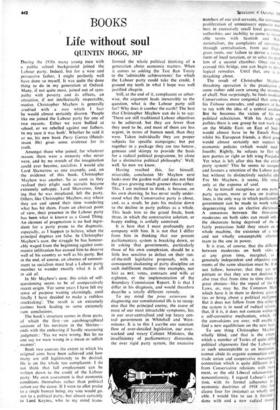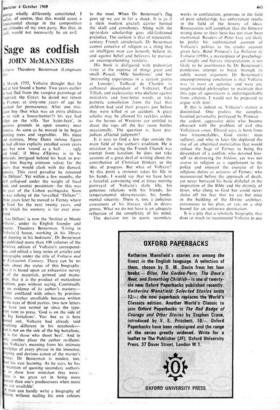BOOKS Life without soul
QUINTIN HOGG, MP
During the 1930s many young men with a public school background joined the Labour party. Indeed, but for a wise and persuasive father, I might perfectly well have done so myself. It was quite the done thing to do in my generation at Oxford. Many, if not quite most, joined out of sym- pathy with poverty and its effects, an attractive, if not intellectually respectable, motive. Christopher Mayhew is generally credited with a mot which I fear he would almost certainly disown. 'People like me joined the Labour party for one of two reasons. Either we were bullied at school, or we rebelled against our fathers. In my case it was both'. Whether he said it or no, his new book Party Games (Hutch- inson 30s) gives some evidence for its truth.
Amongst those who joined, for whatever reason, there were a minority who never were, and by no stretch of the imagination could ever become, socialists. I would cite Lord Shawcross as one example, and, on the evidence of this book, Christopher Mayhew was another. So as soon as they realised their plight such recruits became extremely unhappy. Lord Shawcross, find- ing that he was misplaced, left the party. Others, like Christopher Mayhew, stay where they are and spend their time wondering what has hit them. From an abstract point of view, their presence in the Labour party has been what is known as a Good Thing. An element of pragmatism is no bad ingre- dient for a party prone to the dogmatic, especially, as I happen to believe, when the principal dogmas are false. In Christopher Mayhew's case, the struggle he has honour- ably waged from the beginning against com- munist infiltration has caused him to deserve well of his country as well as his party. But in the end, of course, an absence of commit- ment to socialism must lead a Labour party member to wonder exactly what it is all in aid of.
In Mr Mayhew's case, this crisis of self- questioning seems to be of comparatively recent origin. 'For some years I have felt my sense of purpose waning alarmingly, until finally I have decided to make a ruthless stocktaking'. The result is an extremely curious book leading to some extremely rum conclusions.
The book's structure comes in three parts, of which the first—an autobiographical account of his novitiate in the 'thirties— ends with the endearing if hardly reassuring judgment: .*Yes we were wrong. But let no one say we were wrong in a mean or selfish manner'.
Book two assesses the extent to which his original aims have been achieved and how many are still legitimately to be desired.
He is on the whole too complacent. I do not think that full employment can be written down to the credit of the Labour party. My own assessment is that economic conditions themselves rather than political action are the cause.'lf I were to allot praise to a single human being, my vote would go, not to a political party, but almost certainly to Lord Keynes, who to my mind trans- formed the whole political thinking of a generation about economic matters. When it comes to adding the Test Ban Treaty to the 'admirable achievements' for which the Labour party could take the credit, I ground my teeth in what I hope was well justified chagrin.
Still, at the end of it, complacent or other- wise, the argument leads inexorably to the question, what is the Labour party still for? Why does it cumber the earth? The best that Christopher Mayhew can do is to say: `There are still traditional Labour objectives to be achieved, but they are fewer than they used to be, and most of them are less urgent, in terms of human need, than they were. Taken individually they are proper subjects for specific campaigns; but put together in a package they are too hetero-, geneous and skimpy to provide the basis for a radical political programme, let alone for a distinctive political philosophy'. Well, well. So now we know.
Having reached this, for himself, miserable, conclusion Mr Mayhew next looks over the garden wall and does not find the grass growing much greener there either. This, I am inclined to think, is because, on his own showing, he has never really under- stood what the Conservative party is about, and, as a result, he puts his malaise down to the decline in party politics as a whole. This leads him to the grand finale, book three, in which the constructive solution, or happy ending, is artfully contrived.
It is here that I most profoundly part company with him. It is not that I differ from him in thinking that our present parliamentary system is breaking down, or in asking that governments, particularly those of his own complexion, should be a little less sensitive to defeat on their run- of-the-mill legislative proposals, with a consequent slackening of party discipline on such indifferent matters (my examples, not his) as asr, votes, contracts and wills at eighteen, or the implementation of the Boundary Commission Report. It is that I differ in his diagnosis, and would therefore describe a totally different remedy.
To my mind the pons asinorum in diagnosing our constitutional ills is to recog- nise that the principal enemy, the cause of most of our most intractable symptoms, lies in our over-centralised and top heavy cen- tral government in Whitehall and West- minster. It is to this I ascribe our constant flow of over-detailed legislation, our over- worked and weary Cabinet Ministers, the insufficiency of parliamentary discussion, the over rigid party system, the excessive
numbers of our civil servants, the conseque proliferation of unnecessary opposite nur hers in excessively small local gol,ernme authorities, our inability to come to reaso able terms with Scottish and wet nationalism, the complaints of rernotene through centralisation, from our En211, • grass roots, our failure to devise a ration form of local taxation, or to solve the prol lem of a second chamber. Once one n, crossed this bridge, one can begin to deli. logical remedies. Until that, one is ju thrashing about.
The result of Christopher Mayhew thrashing operation is the production ( some rather odd corn among the mountai of chaff. Not surprisingly, he finds moderal Conservatives more congenial that some his Tribune comrades, and appears at lea, to toy with the idea of a central coalitiot But he becomes the victim of his ow political eclecticism. With his Arab syni pathies there is one group he can work wi on the Middle East; on East of Suez would almost have to be Enoch Powe whilst his European friends, a third grou would almost certainly not support h economic policies (which would need fourth). Rightly, he refuses to flirt wi new parties or right or left wing Poujadis Yet what is left after this but the exist] party system? This he seems to recogni and favours a retention of the Labour part but without its distinctively socialist eth' For Mr Mayhew, it seems, life remit' only at the expense of soul.
As he himself recognises at one point party system, more or less on traditio lines, is the only way in which parliament: government can be made to work with degenerating into an elective diclatotsn A consensus between the bien-pensa moderates on both sides can result only the electorate, being deprived of the o fairly precarious hold they retain on whole machine, the existence of a via and not wholly unacceptable alternat team to the one in power.
It is true, of course, that the differen between moderates on both sides a at any given time, marginal, as genuinely independent and objective as ments of the same situation must be. It d not follow, however, that they are un portant or that they are not decisive. It also true that from time to time there a great choices—like the repeal of the C Laws, or, may be, the Common Mar which have it in them to destroy great - ties or. hring about a political realignm• But it does not follow from this either the system is in need of radical reform, that, if it is, it does not contain within it a self-corrective mechanism, which. the convulsions are over, will enable it find a new equilibrium on the new basis To one thing Christopher Maybe" wholly blind, and that is the extent which a number of Tories of quite diffe political alignments find the Labour as such unacceptable as an institution, cannot abide its organic connection with trade union and cooperative movements connection which is quite different in from Conservative relations with mar ment, or the old Liberal relationship nonconformity. I regard Labour's cons tion, with its formal adherence to economic doctrines of 1918 (the fa clause four for instance) as wholly Jur able. I would like to see it finished done with and a new radical move emerge wholly differently constituted. I realise, of course, that this would cause a fundamental change in the composition and attitudes of my own party. But that, in itself, would not necessarily be an evil.



































 Previous page
Previous page